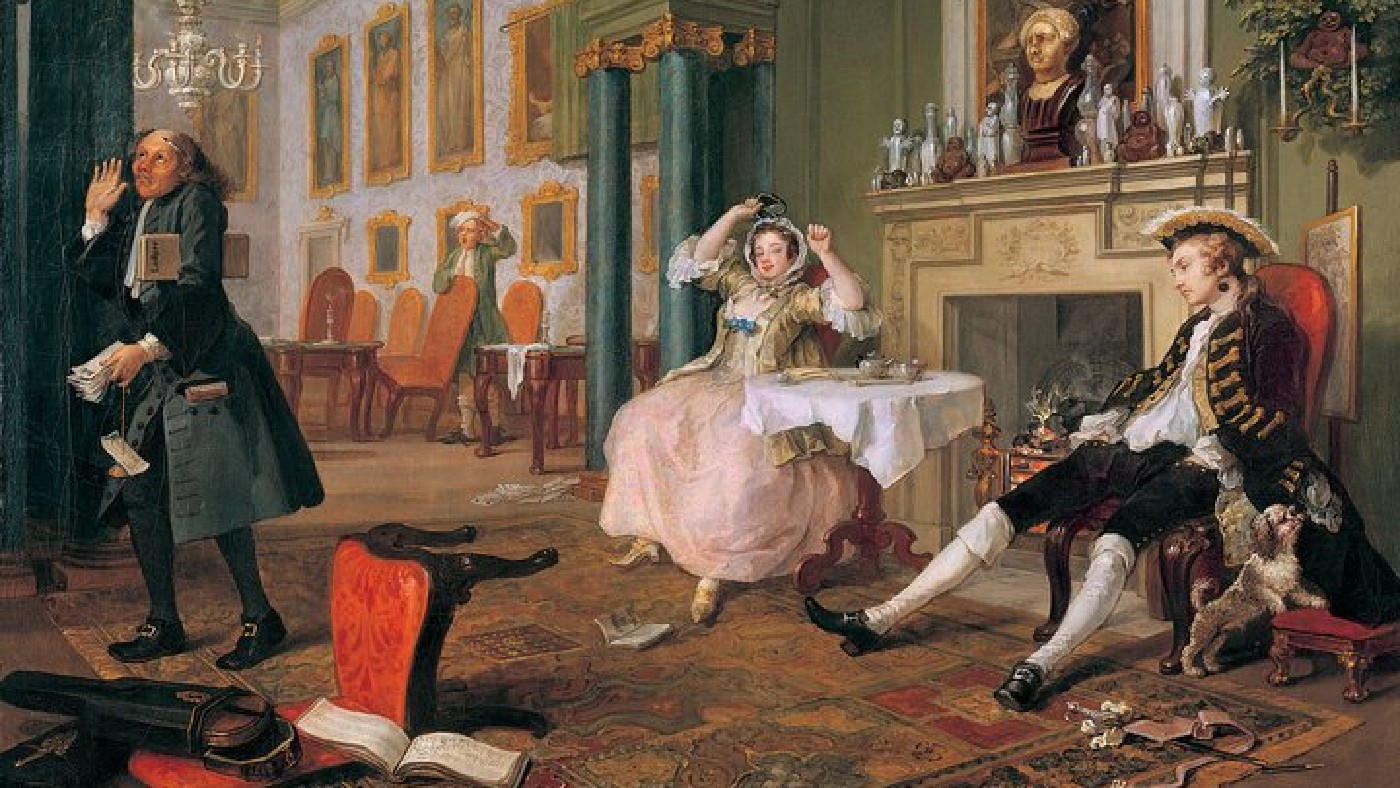Hogarth and Europe at Tate Britain: far from anyone’s idea of a ‘little Englander’
Painter conjured up the ‘drunken lads’, beer and roast beef of Old England – but he was no insular jingoist

A free daily email with the biggest news stories of the day – and the best features from TheWeek.com
You are now subscribed
Your newsletter sign-up was successful
William Hogarth (1697- 1764) is considered a “founding father” of a particularly British type of art, said Kathryn Hughes in The Guardian. The purveyor of broad, boisterous satires such as A Rake’s Progress (1732-34) and Marriage A-la-Mode (c.1743), Hogarth conjured up the “drunken lads”, beer and roast beef of Old England. Yet as this new exhibition at Tate Britain makes clear, he was no insular jingoist.
The show argues that his satirical scenes in fact owed a great debt to artists working on the continent, where he travelled widely, soaking up the artistic traditions of France, Italy and the Netherlands. Bringing together a host of Hogarth’s paintings, prints and drawings as well as carefully chosen works by his European contemporaries, it presents the artist as a cultural magpie possessed of some remarkably modern sensibilities – and “far from anyone’s idea of a ‘little Englander’”.
This argument is supported with much “fascinating evidence”, said Alastair Sooke in The Daily Telegraph. One section pairs major works by Hogarth with paintings by his European contemporaries, demonstrating their likely influence: his famous self-portrait with a pug is displayed alongside a “compositionally similar” work by the Dutch artist Cornelis Troost, while even the “infamously xenophobic” painting O the Roast Beef of Old England (1748) is shown to display “striking parallels” to a “beautiful” still life by Hogarth’s French contemporary Jean-Siméon Chardin.
The Week
Escape your echo chamber. Get the facts behind the news, plus analysis from multiple perspectives.

Sign up for The Week's Free Newsletters
From our morning news briefing to a weekly Good News Newsletter, get the best of The Week delivered directly to your inbox.
From our morning news briefing to a weekly Good News Newsletter, get the best of The Week delivered directly to your inbox.
Yet halfway through, the exhibition changes tack to mount a “sustained attack” on the artist it ostensibly celebrates. Pious captions berate Hogarth for his perceived racism and the ambivalent portrayal of the slave trade in his work; even the raucous scenes of inebriation he captured so riotously in paintings like The March of the Guards to Finchley (1750) are taken to task for legitimising “laddish” behaviour. Watching the Tate’s curators “in paroxysms of embarrassment” about the art they have chosen to show is distinctly “off-putting”.
True, the captions are “censorious and often barely relevant”, said Jackie Wullschläger in the FT. Nevertheless, get past them and there’s much brilliant work. Every picture brims with detail and “satirical and emotional weight”: The Orgy, a scene from A Rake’s Progress, is a whirl of “syphilitic flesh” and conspicuous consumption; The Beggar’s Opera (c.1728) gloriously pictures the prime minister Robert Walpole as a highwayman. In many respects, this is a very enjoyable show; but the self-righteous sociological lectures obscure “the true Hogarth: the innovator expanding the vision of what art could be”.
Tate Britain, London SW1 (020-7887 8888, tate.org.uk). Until 20 March
A free daily email with the biggest news stories of the day – and the best features from TheWeek.com
-
 5 blacked out cartoons about the Epstein file redactions
5 blacked out cartoons about the Epstein file redactionsCartoons Artists take on hidden identities, a censored presidential seal, and more
-
 How Democrats are turning DOJ lemons into partisan lemonade
How Democrats are turning DOJ lemons into partisan lemonadeTODAY’S BIG QUESTION As the Trump administration continues to try — and fail — at indicting its political enemies, Democratic lawmakers have begun seizing the moment for themselves
-
 ICE’s new targets post-Minnesota retreat
ICE’s new targets post-Minnesota retreatIn the Spotlight Several cities are reportedly on ICE’s list for immigration crackdowns
-
 Samurai: a ‘blockbuster’ display of Japan’s legendary warriors
Samurai: a ‘blockbuster’ display of Japan’s legendary warriorsThe Week Recommends British Museum show offers a ‘scintillating journey’ through ‘a world of gore, power and artistic beauty’
-
 BMW iX3: a ‘revolution’ for the German car brand
BMW iX3: a ‘revolution’ for the German car brandThe Week Recommends The electric SUV promises a ‘great balance between ride comfort and driving fun’
-
 Arcadia: Tom Stoppard’s ‘masterpiece’ makes a ‘triumphant’ return
Arcadia: Tom Stoppard’s ‘masterpiece’ makes a ‘triumphant’ returnThe Week Recommends Carrie Cracknell’s revival at the Old Vic ‘grips like a thriller’
-
 My Father’s Shadow: a ‘magically nimble’ love letter to Lagos
My Father’s Shadow: a ‘magically nimble’ love letter to LagosThe Week Recommends Akinola Davies Jr’s touching and ‘tender’ tale of two brothers in 1990s Nigeria
-
 Send Help: Sam Raimi’s ‘compelling’ plane-crash survival thriller
Send Help: Sam Raimi’s ‘compelling’ plane-crash survival thrillerThe Week Recommends Rachel McAdams stars as an office worker who gets stranded on a desert island with her boss
-
 Book reviews: ‘Hated by All the Right People: Tucker Carlson and the Unraveling of the Conservative Mind’ and ‘Football’
Book reviews: ‘Hated by All the Right People: Tucker Carlson and the Unraveling of the Conservative Mind’ and ‘Football’Feature A right-wing pundit’s transformations and a closer look at one of America’s favorite sports
-
 Catherine O'Hara: The madcap actress who sparkled on ‘SCTV’ and ‘Schitt’s Creek’
Catherine O'Hara: The madcap actress who sparkled on ‘SCTV’ and ‘Schitt’s Creek’Feature O'Hara cracked up audiences for more than 50 years
-
 6 gorgeous homes in warm climes
6 gorgeous homes in warm climesFeature Featuring a Spanish Revival in Tucson and Richard Neutra-designed modernist home in Los Angeles